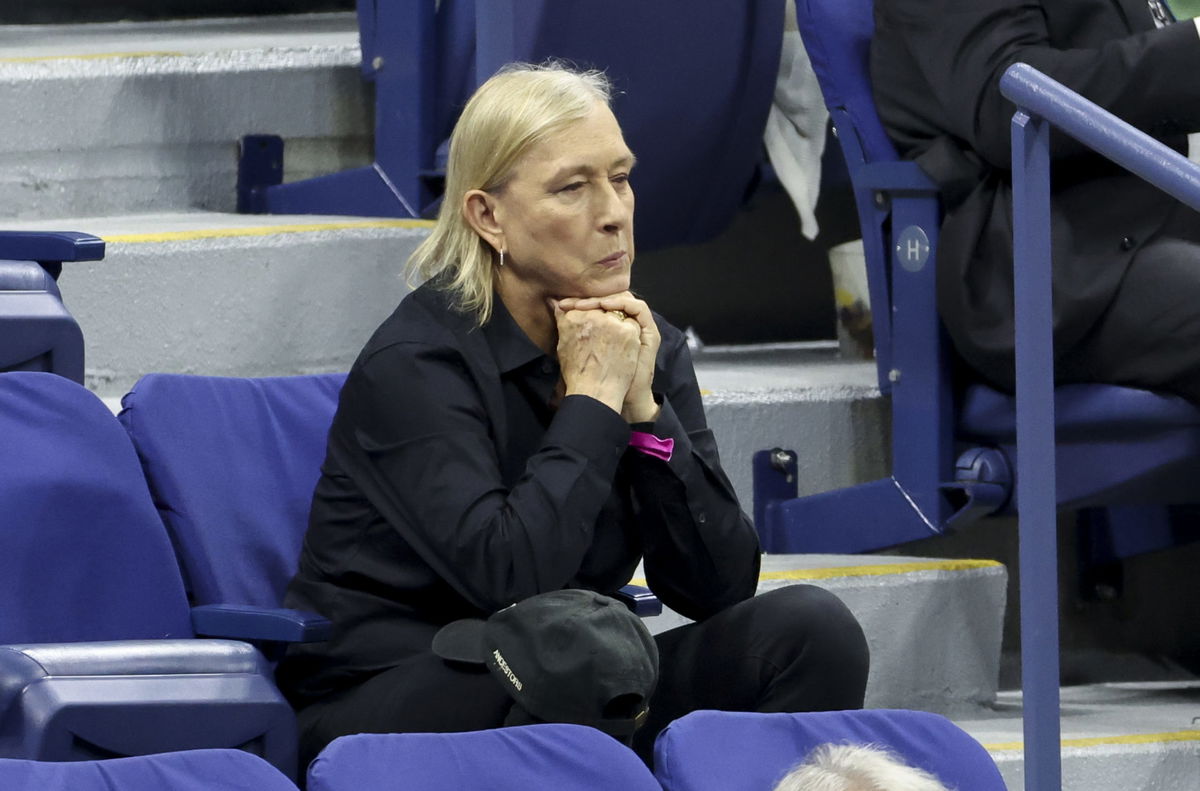
Imago
NEW YORK, NY – SEPTEMBER 9 : Martina Navratilova attends day 12 of the US Open 2022, 4th Grand Slam of the season, at the USTA Billie Jean King National Tennis Center on September 9, 2022 in Queens, New York City. (Photo by Jean Catuffe/GC Images)

Imago
NEW YORK, NY – SEPTEMBER 9 : Martina Navratilova attends day 12 of the US Open 2022, 4th Grand Slam of the season, at the USTA Billie Jean King National Tennis Center on September 9, 2022 in Queens, New York City. (Photo by Jean Catuffe/GC Images)
The recent Twitter exchange between Martina Navratilova, a renowned tennis champion, and Emma Vigeland, an American journalist, has become a contentious flashpoint in the world of social media. This fiery debate revolves around the intricate matter of TERFism. Both parties harbor deeply contrasting perspectives on gender identity and feminism. But Vigeland is feeling the brunt of the 66-year-old tennis star’s criticism. Who would have expected that Vigeland would resort to an unexpected solution? She invoked none other than the amazing Serena Williams to weather the furiously raging debate.
Watch What’s Trending Now!
Navratilova, an upstanding supporter of LGBTQ+ rights, was quick to push back on Vigeland’s tweet. Navratilova believes that womanhood is beyond the trappings of antiquated gender norms.
ADVERTISEMENT
Martina Navratilova’s Twitter debate partner shares an unexpected move with Serena Williams
In her Twitter debate with Emma Vigeland, Martina Navratilova highlighted the breadth of possibilities that womanhood holds. She brought attention to the idea that it should be viewed from a variety of perception. She asserted that any perceptions should go beyond the sole scope of traditional femininity. Unfazed by Navratilova’s sharp critique, Vigeland made an audacious move by conjuring the name of Serena Williams; one of the most venerated athletes in history. Vigeland appeared to try to divert the dialogue away from contentious waters by introducing a more alluring topic. Nonetheless, the subtle sleight of hand wasn’t overlooked by the astute viewers of social media, consequently leading to a sharp chorus of condemnation for musing about her adversary.

ADVERTISEMENT
Serena Williams’ remarkable success in the realm of tennis is not something that can be denied. Yet, when considering Vigeland’s comment, we almost inevitably question the actual intentions behind it. Is it a possible attempt to avoid addressing the underlying issues at stake? Such a move would not only cast doubt on the sincerity of the discussion, however, it would also lessen the significance of the discourse regarding gender identity and feminism in an open and honest setting.
ADVERTISEMENT
Vigeland replied to Navratilova’s tweet, “Serena Williams is the greatest of all time.”
Top Stories
Roger Federer Draws Criticism from Swiss Government Chief for Tourism Boom in Country

Stefanos Tsitsipas Considered Quitting Tennis After Major Personal Setback

Carlos Alcaraz Gets Harsh Reality Check After Father’s Reported Role in Juan Carlos Ferrero Split

Naomi Osaka Reveals How Daughter Influenced Her First Loss of 2026

45-Year-Old Venus Williams Receives 2026 Australian Open Wildcard Entry

Serena Williams is the greatest of all time https://t.co/tLNQife490
— Emma Vigeland – @emmavigeland.bsky.social (@EmmaVigeland) July 10, 2023
The debate started with the journalist’s tweet about TERFism. TERFism stands for ‘Trans-Exclusionary Radical Feminism’. It refers to a highly controversial ideology that denies the inclusion of transgender women within feminist circles. This discriminatory viewpoint is based on the assumption that womanhood is intrinsically linked to one’s reproductive anatomy. It creates a false notion of binary gender roles and a rigid binary system.
ADVERTISEMENT
Such an archaic belief system has spurred intensive debates both within feminist circles and the larger world community, consequently leading to TERFism facing frequent criticism for the enforcement of regressive stereotypes and for reinforcing traditional gender roles.
ADVERTISEMENT
Navratilova provides a provocative conclusion to the debate and talks about the role of patriarchy
In a peculiar tweet that brought an unexpected end to the heated debate with Vigeland, Navratilova added another layer of complexity to the conversation. With a succinct statement, Navratilova suggested that the oppression of women could be attributed to patriarchy. She particularly highlighted the influence of white patriarchy as the dominant force in societal power dynamics.
Could be because oppression of women is the fault of patriarchy, and white patriarchy sits on top of that pyramid.
— Martina Navratilova (@Martina) July 11, 2023
This brief remark introduced a crucial intersectional perspective, acknowledging that the struggle against gender-based oppression intersects with other forms of oppression and privilege. Navratilova’s tweet served as a reminder of the intricate nature of social hierarchies and the need to address multiple layers of oppression to achieve true equality and justice.
ADVERTISEMENT
How do we actively foster a socially just environment and work towards lasting social equality? While the answer may seem daunting, it is only through challenging these systems and actively contributing to dismantling them, that we can create a better future for those most vulnerable to oppression and exclusion.
ADVERTISEMENT
ADVERTISEMENT
ADVERTISEMENT

